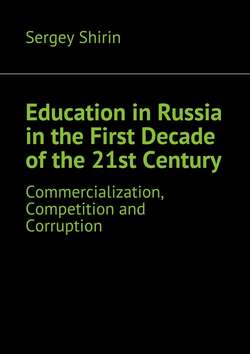Читать книгу Education in Russia in the First Decade of the 21st Century - Сергей Ширин - Страница 3
Part 1. Competition law in education
Оглавление1. Is providing free education a commercial service according to national legislation?
The term “educational service” is found in the Law of the Russian Federation (RF) “On education” №3266—1, dated 10 July 1992 in the articles and clauses devoted to paid education. Only three times in the text of the Law use of the term concerns not only paid education, but also a free one. In part 8, Article 19, it is stated: “Educational establishments according to agreements and together with enterprises, institutions, organizations may provide training to students as an additional (including paid) educational service.” Similarly, in part 4, Article 50 one can read that students of all educational establishments have the right to “receive additional (including paid) educational services.” Thus, paid services are only a part of a more general notion of “educational services”. So, free education can be regarded as a service, too, and it’s providing, according to part 8, Article 19, is possible “with a license (permission) to the specified activity” only. In addition, clauses 16 and 17, Article 28 place establishing the general principles of financing of educational services and financing of federal government educational institutions and educational services itself among the credentials of federal bodies of state authority in the field of education.
It turns out that education belongs to the sphere of services, rather than to the social sphere, regardless of being paid or free.
However, as the Law stipulates that educational organisations may be established in the legal forms provided by the civil legislation for non-profit organizations only (Article11.1 of the RF Law “On Education”), commercial organizations are not allowed to carry on educational activities and, therefore, education is not regarded as a commercial service.
2. Is providing paid education a commercial service according to national legislation?
RF Law “On education” №3266—1 dated 10 July 1992 stipulates the right of educational institutions to attract additional financial resources, within the limits of the procedure established by RF legislation, by selling additional educational and other services specified in the statutes of educational institutions (part 8, Article 41). But the fact of providing paid education services does not mean their commercial nature. To become commercial, they are necessary to be provided not just for attracting additional financial resources, but for profit. According to part 2, Article 46 paid educational activities are not considered as business, if the derived income is used for covering costs of the educational process (including salaries), its development and improvement in the educational institution. If there is no business activity, one can not speak about commercial services.
Article 46 applies only to non-governmental educational institutions. Federal and local government agencies are not free at the disposal of revenues from providing paid educational services at all. Revenues may be used in accordance with the statutory objectives only. Therefore, such institutions generally can not be considered as ones carrying out commercial activities by means of paid educational services. Their services, rather, should be recognized as non-profitable ones. In addition, Article 47 of the Law “On Education”, which determines the list of business activities of educational institutions, does not include the paid educational services in this list.
3. Please describe other activities provided by educational institutions and their qualification as (public) services or otherwise?
In addition to the purely educational activities, educational institutions in Russia carry out research and development work, library science, publishing and printing activities, they are involved in organizing recreational activities, including theatrical shows, sporting, cultural, educational, and recreational and holiday events, etc. Educational institutions may also have non-commercial educational enterprises for students doing industrial practical work. All this kinds of activities are considered as non-commercial ones only if received income is reinvested in the educational process of the institution, and if such activities are stipulated by the institutions’ charters (clause 3, Article 47 of the RF Law “On Education”).
4. Are schools allowed to have commercial activities, and if affirmative, under what conditions?
The RF Law “On Education” determines that the educational institution is a legal entity. And according to the norms of civil law, it may be a party of economic transactions, i.e., to run business within the limits prescribed by the Civil Code of Russian Federation and other Federal Laws.
These limits are listed in Article 47 of the Law “On Education”:
Educational institutions may engage in business activities only stated in the Law. There are only a few activities from the entire spectrum of civil transactions: the transfer of property rights (lease), commercial representation (commission, agency), purchase and sale (in the form of retail sale), participating in particular partnership. However, here should be added other profitable secondary operations not associated directly with the production and selling of goods, works and services that are mentioned in the statute. This significantly extends the range of possible types of business activity.
Educational institution may only engage in the type of business activity specifically stated in its charter. By this fact educational institutions significantly differ from other legal entities that have the right to carry out any activity not prohibited by the Federal Laws, unless it contradicts the object and purpose of the activities, stated in the Charter of legal entity.
